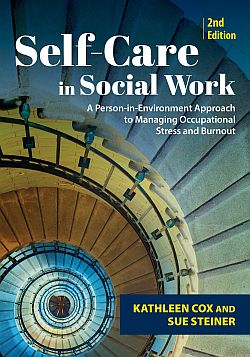Self-Care Book Uses Cognitive Approach to Occupational Stress Management
Publications
By Paul R. Pace 
Kathleen “Kathy” Cox, PhD, LCSW, professor emerita at the School of Social Work at California State University, Chico; and Sue Steiner, PhD, MSW, a professor at the same university, recently published the second edition of their book “Self-Care in Social Work: A Person-in-Environment Approach to Managing Occupational Stress and Burnout.” They say they were inspired to write the book after their students said they were seeking a remedy for occupational stress.
“These students voiced confusion about what was meant by the term self-care and frustration due to their already-packed schedules that afforded little to no time for commonly encouraged self-care activities,” Cox said. “Dr. Steiner and I wanted to dive into the meaning of self-care with the idea that it is more than an add-on activity and can be conceptualized as a state of mind. We also wanted to explore actions that social service organizations can take to promote employee self-care and wellness.”
Cox said the text departs from other self-care books due to its inclusion of a cognitive approach to managing occupational stress.
“Our intent is to help workers identify thinking patterns that contribute to workplace stress as well as those that have been found to aid in coping,” she said. “Chapters are devoted to self-assessment, self-regulation, and self-efficacy, with tools offered to promote each. The book also assumes a macro approach to self-care by covering aspects of workplace culture that can be leveraged to reduce stress; supervision strategies for promoting self-care; and agency policies and procedures that further workplace wellness.”
The second edition includes current research on the impact of stress, burnout, secondary trauma, and vicarious trauma. Self-compassion is presented as a tool for self-regulation, alongside material on cognitive reframes, mindfulness, and balanced use of empathy.